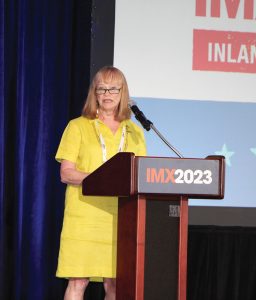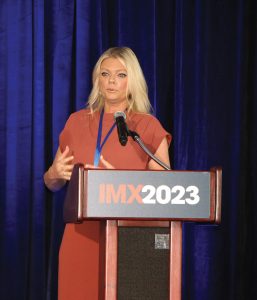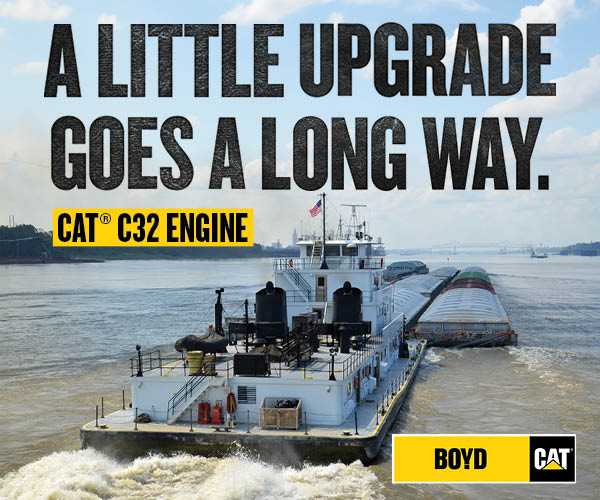The Inland Marine Expo, hosted by The Waterways Journal, celebrated its 10th edition in a new city in 2023, and the journey to Nashville, Tenn., brought along with it both record-setting verified attendance and number of exhibitors.
IMX was held May 31-June 2 at Music City Center and will return to Nashville May 29-31, 2024.
Maritime Throwdown
The festivities kicked off with a welcome reception the evening of May 31 that coincided with the finals of Maritime Throwdown, a timed obstacle course competition that includes maritime skills such as knot-tying and line-throwing. About two dozen competitors faced off in qualifying rounds of the competition in Paducah, Ky., Houston, Texas, and New Orleans, La., before the finals at IMX, where the top six competed.
The 2022 Maritime Throwdown champion, Anthony Pettry of Amherst Madison, repeated as this year’s winner, earning a low score of 15, for which he took home the top prize of $7,000 along with the 120-pound custom-made, kevel-topped trophy.
Second place went to Leighton Loveless of Ingram Barge Company with a score of 20. His prize was $2,000. Michael Taylor of Barge Transfer Services received $1,000 as the third-place winner, with a score of 21.
State Of The Industry
Education sessions began on June 1, beginning with the opening session titled “The State of the Maritime Industry and What’s to Come.”
A welcome from John Roberts, president and CEO of Ingram Marine Group, which is based in Nashville, got the day started. He highlighted the history of IMX, which has grown to a conference and trade show with approximately 230 exhibitors today. The IMX achievement award began in 2014, and IMX presented its sixth class of 40 Under 40 award winners at this year’s expo.
Panelists for the opening session were Clark Todd, president and CEO of Blessey Marine Services and immediate past chairman of The American Waterways Operators (AWO); Cherrie Felder, vice president of Channel Shipyard Companies and chairman of Waterways Council Inc. (WCI); and Aimee Andres, executive director of Inland Rivers, Ports & Terminals(IRPT).
Todd spoke about challenges within the industry, noting that both to protect American jobs and ensure national security, “defending the Jones Act is always going to be the priority of those of us in the inland marine industry.”
He also stressed the importance of safety, saying that while some companies are seeing an uptick in reportable incidents, that may be because the tracking of them has improved.
“At the end of the day, our mariners are absolutely the most important asset we have as an industry,” Todd said.
A newer challenge for the industry is that of sustainability, he said.
“Every single one of our clients is urging us to do more,” Todd said, which creates a challenge for a mode of transportation that is already the most environmentally friendly to take that work to the next level.
The most important challenge the industry faces is workforce development, he said, noting that while four or five years ago it was rare to see positions such as “talent development specialist,” many companies now have similar positions.
“We all need to tell the good story we have as inland marine operators and as inland marine suppliers,” he said.
Todd also took time to speak about market conditions. “The market is strong,” he said. “The market is robust.”
The industry has recovered well from the COVID-19 pandemic, he added, praising its resilience. He classified the marketplace overall as “very stable.”
“I think we’re in a true equilibrium for the first time in three or four years,” he said.

Felder began by highlighting some important statistics about the inland waterways industry, adding that it is a critical part of the country’s transportation supply chain. The system moves nearly 500 million tons annually, valued at more than $150 billion. Sixty-five percent of the country’s grain exports move on the river system. As many as 540,000 jobs depend on inland navigation, she said.
“As everyone in this room knows, we do it safer, more energy efficiently and in a more environmentally friendly way than any other mode of surface transportation,” Felder said. “There’s no doubt in anybody’s mind that that the inland waterways are a critical part of our nation’s transportation network and supply chain, but our challenge as a nation and at WCI is that the locks that facilitate this navigation and all the other many benefits of the inland waterways, such as hydropower, city water supplies and recreation, are living on borrowed time. Eighty percent of these locks are well past 50 years of age and are long past their design lives. They are not aging gracefully at all.”
Felder showed a chart that indicated an increase in scheduled main lock chamber mechanical closures of more than one day coincided with fewer unscheduled closures over the past few years.
She also spoke about the $2.5 billion allocated for inland waterway construction projects in the Infrastructure Investment and Jobs Act, a 400 percent increase from the last infrastructure package, the American Recovery and Reinvestment package.
Projects included in IIJA include the Three Rivers program on the McClellan-Kerr Arkansas Navigation System; the Arkansas River Navigation Study, which includes the potential deepening of the MKARNS to 12 feet; the major rehabilitation of the T.J. O’Brien Lock and Dam on the Illinois Waterway; the first major funding for the Navigation and Ecosystem Sustainability Program (NESP) on the Upper Mississippi and Illinois waterways; continued funding for the Kentucky Lock Addition Project on the Tennessee River; infrastructure improvements on the Upper Ohio River at Montgomery Lock and Dam; and work on the Upper Ohio at Emsworth Lock & Dam.
Of the amount allocated by the IIJA for inland waterway construction projects, only $113.5 million remains unspent, she said.
Looking toward the future, work has already begun on the content of the 2024 Water Resources Development Act (WRDA), Felder said. The 2022 WRDA included a cost-share adjustment of 65 percent/35 percent general fund vs. Inland Waterways Trust Fund (IWTF) and established a precedent for other beneficial cost-sharing formulas for specified projects, she added.
Updating the Capital Investment Strategy will be important moving forward, Felder said. The strategy, which is required to be updated by the Inland Waterways Users Board every five years, prioritizes the investment of infrastructure funding and is due later this year.
“WCI does believe this is a critical step to ensure that we are investing in the right projects in order to maximize the benefits of the system,” Felder said. “As a system, the inland waterways have been successful in receiving funding in the past 10 years mainly because the stakeholders have spoken with one voice for the entire system, and we need to continue to do that. I think it will be critical so that we can get through this period of inflation and supply chain issues, so we’re going to work hard on keeping that one voice in place.”
Felder also noted that WCI will continue its opposition to any tolls or lockage fees.

Andres spoke about issues impacting ports and terminals and affecting the way they do business.
“Whether you believe in climate change or not, we have a fluctuation of the rivers’ rise and fall,” she said.
Additionally, she said, investing in infrastructure, both at ports and throughout the system remains essential. IRPT can help guide people through the 17 available federal programs, Andres said. She cautioned that with IIJA funding expected to expire after five years and the program already being a year old, funding may soon be more difficult to come by.
Andres said ports and terminals need to be asking themselves now, “What infrastructure do we need to improve and build upon?”
Other Highlights
Other IMX sessions included topics such as decarbonization, safety and a closer look at the fleet’s composition of towboats, tugs, barges and dredges along with a session on vessel construction and repair and one on lessons learned from Subchapter M implementation. The 40 Under 40 Awards were presented as part of a special luncheon on the last day of the expo. The IMX Achievement Award was awarded posthumously to Mike Rushing, founder of Rushing Marine Service, LLC of Jackson, Mo., and a founder and early leader of the Towing Vessel Inspection Bureau. It was accepted by his family.
Future editions of The Waterways Journal will include more detailed coverage from throughout IMX.




